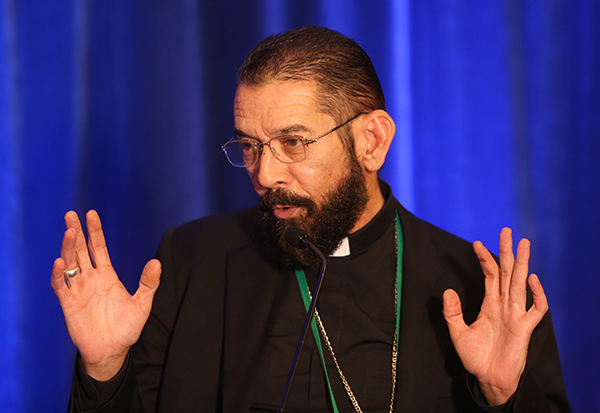
WASHINGTON — The Catholic bishops’ first day of public sessions during their spring meeting in Orlando, Florida, June 15 started and ended with discussion about the Church’s ongoing efforts in the synodal process.
The work of the synod is a three-year effort in the Catholic Church involving listening to Catholics and compiling their views to submit to the pope and determine future steps. It began in Rome in 2021 and has continued on the diocesan level for the past year in preparation for Synods of Bishops in 2023 and 2024.
“The purpose of walking this synodal path is to make our evangelization more effective in the context of the precise challenges that we face today,” said Archbishop Christophe Pierre, apostolic nuncio to the United States, in introductory remarks to the bishops.
The nuncio stressed that the synod was not another program but instead is “more about a way of being Church,” or put another way, he described it as “more like a compass” than a GPS.
He also said many of the questions raised so far should be in the process of being answered — such as where are we as a Church and where are we headed.
Archbishop Pierre said that a goal of the synod was to reach the peripheries, not necessarily to “fill the churches” but to go “where Christ is not already known and loved … [and] put him there by our own presence!”
Another goal was to unite people, not divide them, stressing: “To overcome polarization, we must learn to listen to one another, work together, and walk together.”
He said a clear example of someone who understood how to be part of the synodal Church was Los Angeles Bishop David O’Connell, who was killed four months ago.
“Here was a shepherd who immersed himself in the reality of his sheep, who walked with them, and was with them in finding a way no matter the difficulty of their circumstances,” he said.
The bishops were also given an update on the synodal process by Bishop Daniel Flores of Brownsville, Texas, who has been coordinating the synod process for the bishops of the United States and was appointed to be one of seven members of a preparatory commission for the general assembly of the Synod of Bishops in October.
Bishop Flores, who heads the bishops’ Committee on Doctrine, has helped put together the North American Synod Report, one of seven reports being issued around the world.
He said that throughout the process of consulting with Catholics, Church leaders have “heard and learned many things.”
He also noted that the process was a new one for many and “if it seemed like we were creating a path while we walked it, it’s true.”
The bishop said some of the themes that have emerged from the listening sessions were a love for the Church coupled with frustration and pain. This input from Catholics, he said, complements the work of the bishops by helping them to see where the Church is and the direction it is going.
“There is much yet we must do,” he concluded.
